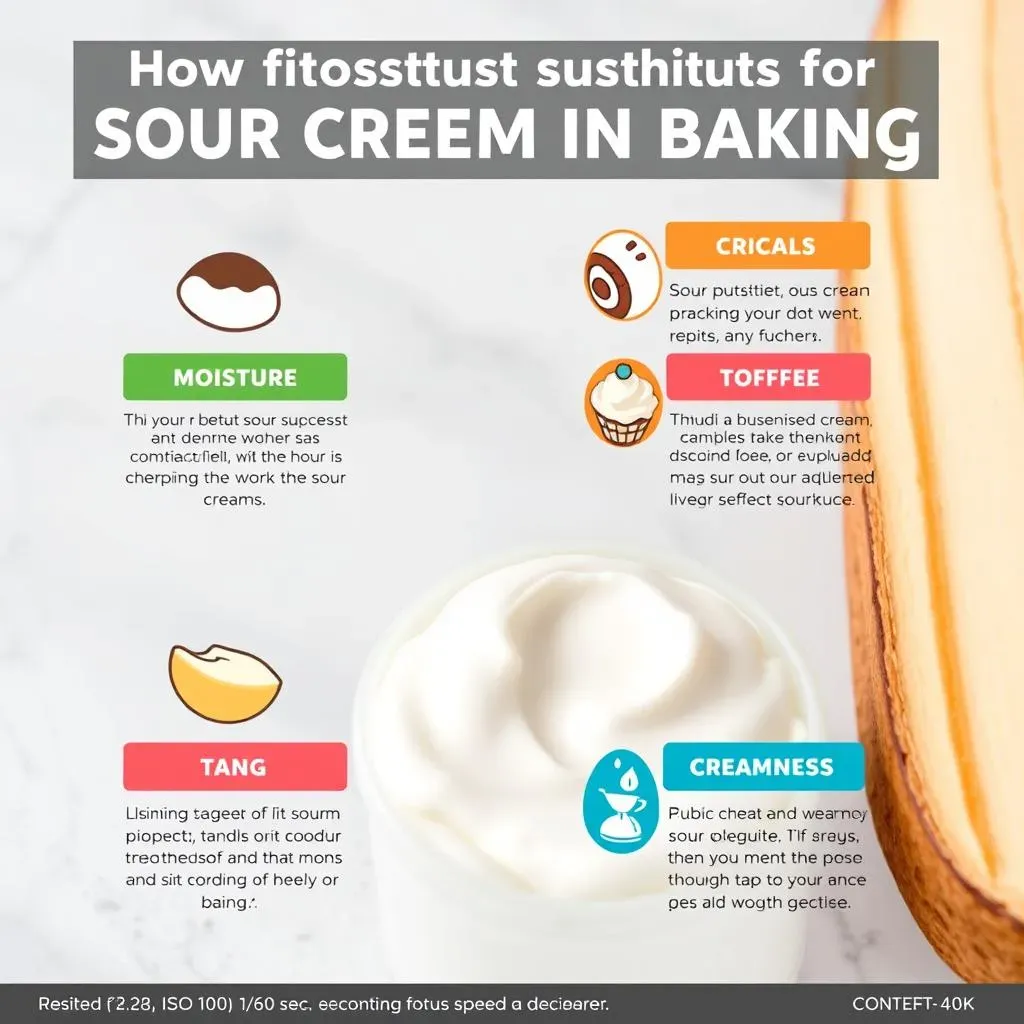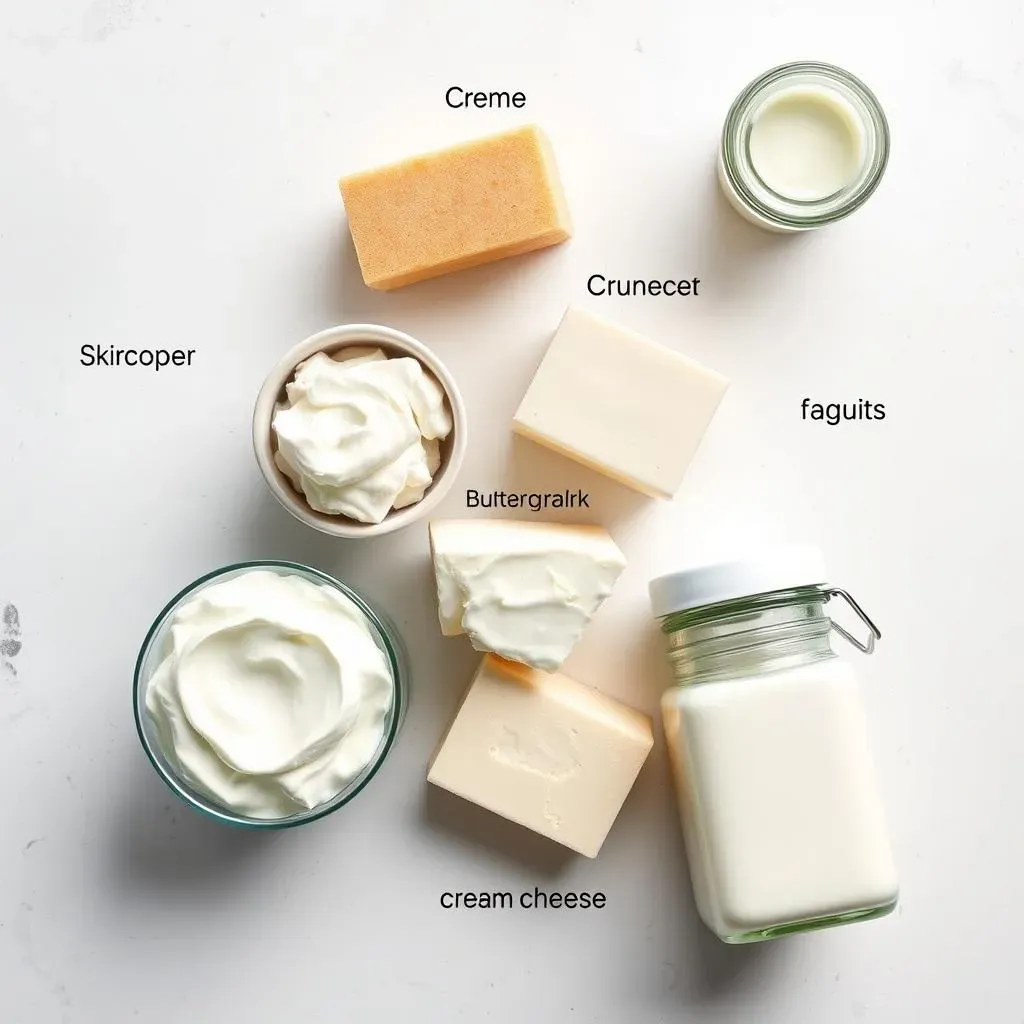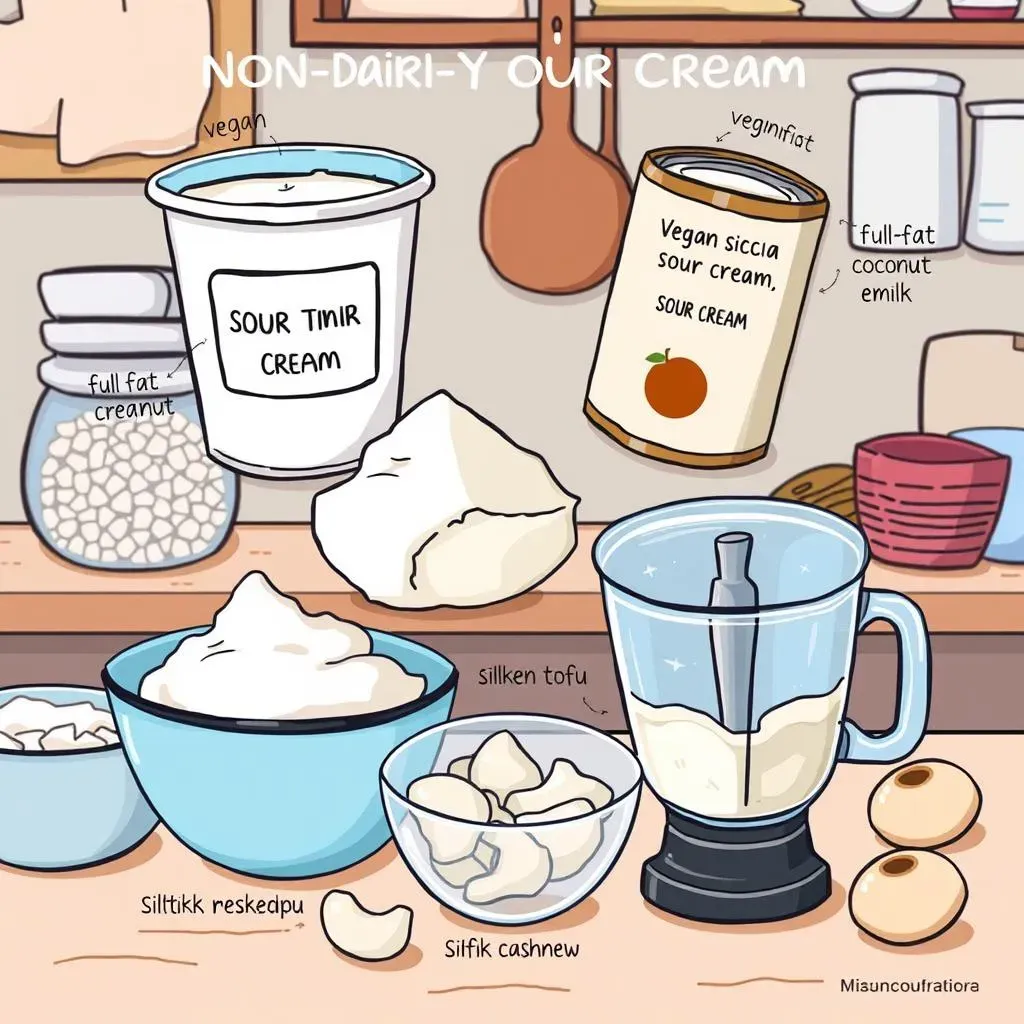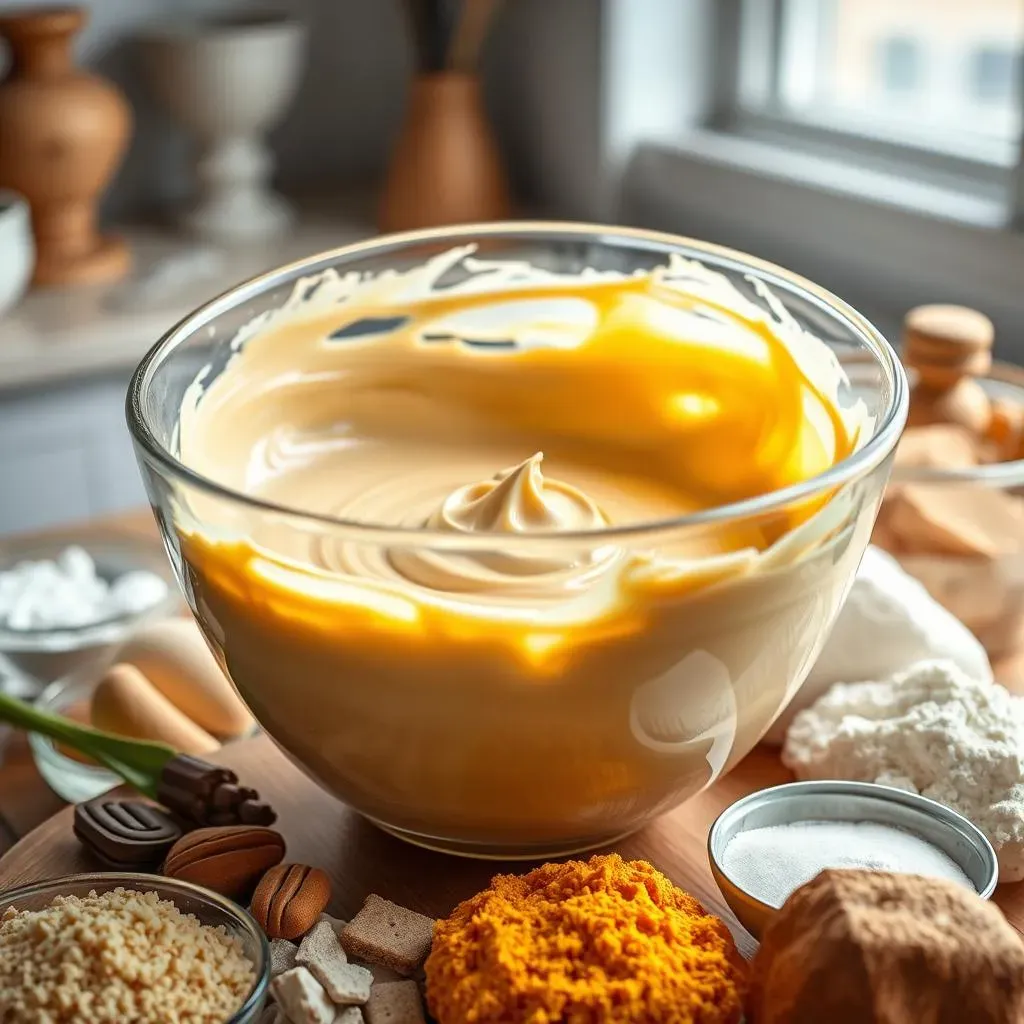Table of Contents
Ever found yourself mid-recipe, ready to bake that delicious cake, only to discover you're completely out of sour cream? I've been there, and it's a real baking buzzkill. But don't panic! The good news is that there are plenty of fantastic substitutes that can save the day and ensure your baked goods turn out moist, tender, and delicious. This article will be your guide to answering the question "what can I substitute for sour cream when baking?" We'll explore a variety of options, from common dairy products you might already have in your fridge to some surprisingly effective non-dairy alternatives. I'll walk you through each substitute, explaining how to use them and what to expect in terms of flavor and texture. So, whether you're a seasoned baker or just starting out, get ready to unlock the secrets to successful baking, even without sour cream!
What Can I Substitute for Sour Cream When Baking?

What Can I Substitute for Sour Cream When Baking?
Okay, so you're staring at your recipe, and it calls for sour cream, but your fridge is letting you down. Don't sweat it, because you've got options! Sour cream is often used in baking to add moisture, a bit of tang, and that lovely creamy texture. When we're thinking about what can I substitute for sour cream when baking, we need to consider these three things: moisture, tang, and creaminess. Luckily, there are several ingredients that can mimic these qualities, and most of them are probably already in your kitchen. Let’s explore some of them!
Dairy Substitutes for Sour Cream When Baking

Dairy Substitutes for Sour Cream When Baking
Alright, let's talk about the dairy aisle heroes, the ones that can swoop in and save your baking project. First up, we have Greek yogurt. This stuff is a real champion. It's thick, it's tangy, and it's got that creamy vibe we're after. When using Greek yogurt as a substitute, I usually go for the full-fat version to get as close to the richness of sour cream as possible. Then, there's crème fraîche. This is like sour cream's fancy cousin. It's got a higher fat content, making it super decadent and perfect for when you need that extra oomph. Just be aware, it can be a bit thicker than sour cream, so you might need to thin it out with a splash of milk or lemon juice. Another option is cream cheese. Now, this one is a bit different, but it can work wonders in baking. It's dense and creamy, and it adds a lovely richness. Again, you might want to soften it and mix it with a bit of milk or yogurt to get the right consistency. Finally, we have buttermilk, which is a bit thinner than sour cream, but it still has that tang that we need. It's great for adding moisture to cakes and quick breads, but you might need to adjust the amount of liquid in your recipe to compensate for its thinner consistency.
Dairy Substitute | Best Use | Notes |
|---|---|---|
Greek Yogurt (Full-Fat) | General baking, muffins, cakes | Adds tang and moisture, very versatile. |
Crème Fraîche | Rich cakes, frostings | Thicker than sour cream, use sparingly. |
Cream Cheese | Cheesecakes, dense cakes | Soften and mix with liquid for best results. |
Buttermilk | Cakes, quick breads | Thinner, may need to adjust liquid in recipe. |
NonDairy Alternatives for Sour Cream When Baking

NonDairy Alternatives for Sour Cream When Baking
Plant-Based Powerhouses
Okay, so maybe you're not into dairy, or perhaps you've got a friend who's vegan and you want to bake them a treat. No problem! The world of non-dairy alternatives has come a long way, and there are some seriously great options for replacing sour cream in baking. First off, let's talk about vegan sour cream. You can find this in most grocery stores now, and it's designed to mimic the texture and tang of regular sour cream. It's usually made from things like cashews, soy, or coconut, and it can be a pretty straightforward 1:1 substitute. Another great option is coconut milk. Now, I'm not talking about the watery stuff you might use in a curry; I mean the thick, creamy part from a can of full-fat coconut milk. You'll need to add a little lemon juice or vinegar to give it that sour tang, but it works surprisingly well, especially in recipes where you want a bit of extra moisture.
Other Non-Dairy Options
Beyond the usual suspects, we have some other non-dairy wonders. Silken tofu is a bit of an unsung hero in the baking world. It's incredibly smooth and creamy, and when blended, it can mimic the texture of sour cream beautifully. You'll need to add some lemon juice to get that tang, but it's a great option, especially if you're looking to add some extra protein to your baked goods. Then, there’s also a cashew cream, which is made by soaking cashews and then blending them with water. It creates a really rich, creamy base that can be used in place of sour cream. Again, you'll need that touch of acidity to get it just right. Just remember, when using these substitutes, you might need to tweak things a little to get the perfect balance, but don't be afraid to experiment!
Non-Dairy Substitute | Best Use | Notes |
|---|---|---|
Vegan Sour Cream | General baking, dips | Easy 1:1 substitute, check ingredients. |
Full-Fat Coconut Milk | Moist cakes, muffins | Use thick part, add acid for tang. |
Silken Tofu | Smooth cakes, fillings | Blend until smooth, add acid. |
Cashew Cream | Rich cakes, frostings | Soak cashews, blend until smooth, add acid. |
Adjusting Your Baking When Substituting Sour Cream

Adjusting Your Baking When Substituting Sour Cream
The Moisture Factor
Okay, so you've picked your sour cream substitute, but now you need to think about how it might change your recipe. One of the biggest things to watch out for is moisture. Sour cream adds a good amount of moisture to your baked goods, and some substitutes are wetter or drier than others. For instance, buttermilk is quite thin, so if you're swapping it in, you might need to reduce the amount of other liquids in your recipe. On the flip side, cream cheese is quite dense, so you might need to add a splash of milk or lemon juice to get the right consistency. The key here is to pay attention to the batter or dough. It should look smooth and well-combined, not too runny or too thick. And don't be afraid to adjust as you go. Baking is a bit of a science, but it's also an art, so trust your instincts.
The Tang and Texture Tango
Beyond moisture, we also need to consider the tang and texture that sour cream brings to the table. That little bit of acidity is really important in some recipes, like cakes and muffins, as it helps to activate the baking soda or powder, which gives your baked goods that nice rise. If you're using a substitute that doesn't have much tang, like silken tofu, you'll definitely want to add a little lemon juice or vinegar to get that same effect. The texture is also important. Sour cream is thick and creamy, and you want your substitute to mimic that as closely as possible. If you're using something that's a bit grainy, like some brands of vegan sour cream, you might need to blend it until it's smooth. And if you're using something that's too thick, like cream cheese, you'll need to thin it out. It's all about finding the right balance. And remember, a little experimentation never hurt anyone!
Substitute Type | Moisture Level | Tang Level | Texture | Adjustment Tips |
|---|---|---|---|---|
Buttermilk | High | Medium | Thin | Reduce other liquids, add thickener if needed |
Cream Cheese | Low | Low | Dense | Add liquid to thin, consider acid for tang |
Greek Yogurt | Medium | Medium | Thick | Use full-fat for best results, can be thinned |
Silken Tofu | High | Low | Smooth | Add acid for tang, blend if needed |
Vegan Sour Cream | Medium | Medium | Variable | Check ingredients, blend if grainy |